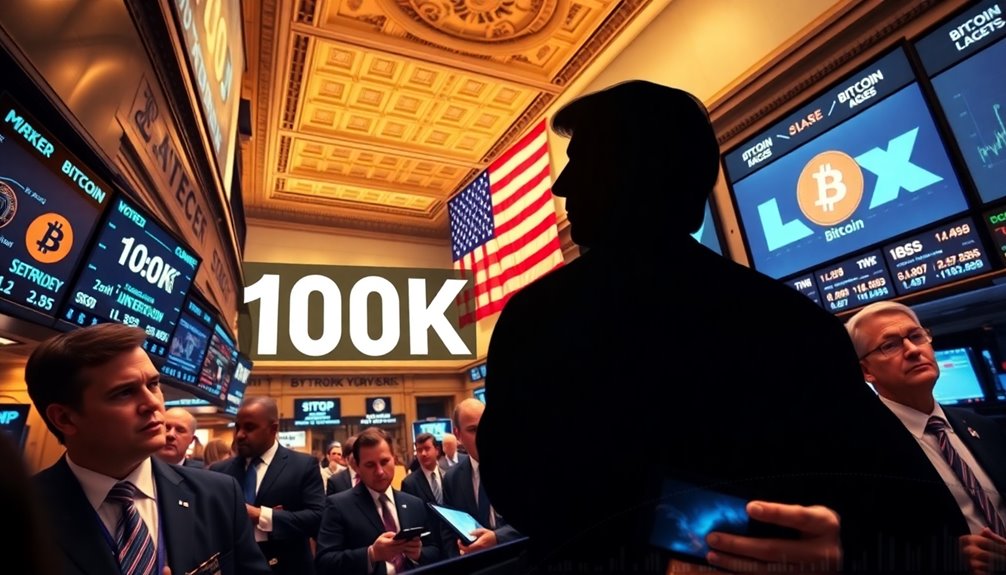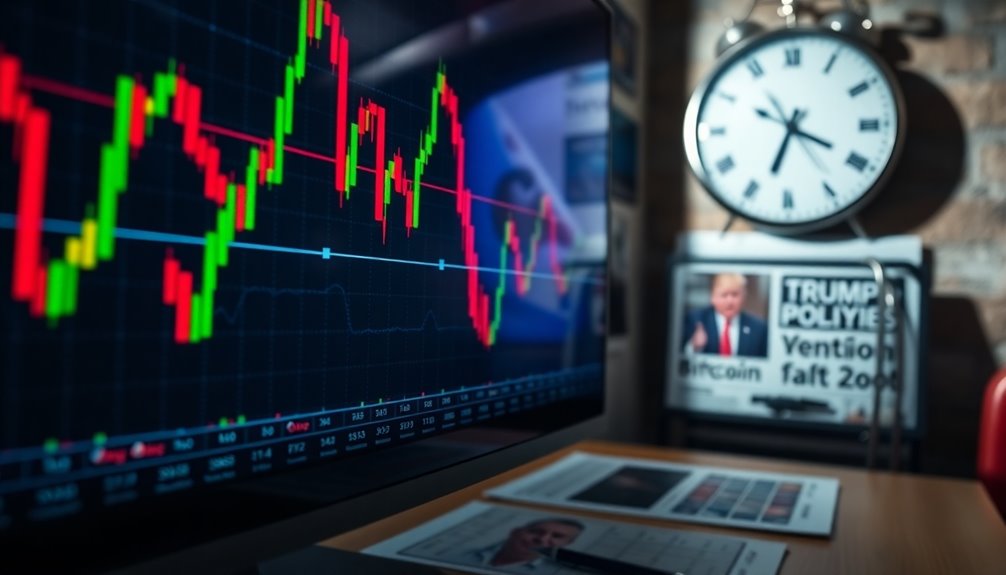As you consider the potential impact of Trump's economic policies on Bitcoin, it's crucial to recognize how his tariff proposals and a stronger dollar might create turbulence in the crypto market. With inflationary pressures on the rise, Bitcoin's status as a risk asset could be jeopardized, particularly if market sentiment shifts dramatically. You'll want to keep an eye on regulatory changes and political dynamics, as these elements could define Bitcoin's path in the months ahead. What specific factors should you prioritize to stay ahead of this unfolding situation?
Key Takeaways
- Trump's tariff proposals may cause increased market volatility, negatively impacting Bitcoin's stability and potentially driving prices down to $80K.
- Rising inflation from universal tariffs could diminish Bitcoin's appeal as a risk asset, leading to further price declines.
- Anticipated regulatory changes and legal challenges against Trump's policies may create uncertainty, triggering significant fluctuations in Bitcoin's value.
- Market sentiment and trading volume may surge during major economic events, influencing Bitcoin prices and the likelihood of a crash to $80K.
- The political landscape, including campaign donations and candidates courting crypto support, will significantly affect future Bitcoin market trends amid Trump's policies.
Trump's Economic Impact on Bitcoin

As Trump's economic policies take shape, their effects on Bitcoin become increasingly evident. The strong dollar, fueled by potential tariffs and strong employment figures, creates pressure on Bitcoin, leading to market volatility. Analysts predict increased volatility due to Trump's proposed tariff plans, which could further complicate the situation for digital assets.
You might notice that as uncertainty looms over Trump's economic agenda, Bitcoin prices begin to decline. Higher bond yields further strengthen the dollar, adding to Bitcoin's instability.
Additionally, Trump's plans for universal tariffs could spark inflationary pressures, impacting the broader economic landscape. With the market reacting to these changes, you'll see that Bitcoin's allure as a risk asset diminishes.
It's crucial to keep an eye on these developments, as they could significantly influence Bitcoin's future trajectory amid shifting economic policies.
Trump's Legal Challenges Intensify

The economic landscape shaped by Trump's policies isn't the only area facing turbulence; his legal challenges are escalating as well.
A coalition of pro-democracy organizations, including Democracy Forward and Demand Justice, launched Democracy 2025 to combat anticipated threats from a potential Trump administration.
They've created a "Threat Matrix" to identify 221 critical issues, from national security to civil rights. This coalition includes 280+ pro-democracy organizations that aim to strengthen advocacy efforts across the country.
With a proven track record of winning nearly 80% of their cases against the previous administration, these groups are ready to act swiftly if Trump attempts to undermine essential protections.
Their legal expertise will be crucial in pushing back against any unlawful actions, ensuring accountability and safeguarding democracy during this precarious time.
Market Volatility and Inflation Rates

Market volatility and inflation rates are intricately linked, often creating a turbulent environment for investors.
When inflation rises, you might notice a surge in market sentiment, causing rapid price fluctuations in assets like Bitcoin. Trading volume can spike as investors react to economic events and regulatory changes, leading to swift price movements. Market sentiment is heavily influenced by news and social media, which can further amplify these fluctuations.
Anticipation of regulatory approvals, like Bitcoin ETFs, can also impact prices positively. However, bad news or regulatory uncertainty can trigger panic selling, making the market erratic.
As liquidity shifts, particularly in futures markets, you could see significant price disruptions.
Corporate Blockchain Integration

While many industries grapple with the challenges of modern technology, corporate blockchain integration is transforming how businesses operate.
Companies like Walmart and Nestle are using blockchain to enhance transparency in their supply chains, ensuring products move efficiently from farm to store. Additionally, blockchain technology is being utilized to improve tracking for food safety, as seen in Nestle's initiatives.
In healthcare, organizations like UnitedHealthcare and Novo Nordisk are leveraging blockchain to improve medical records management and secure patient data.
Financial institutions, including JPMorgan Chase and HSBC, are digitizing records and streamlining transactions with blockchain technology.
Even logistics giants like UPS and DHL are implementing blockchain solutions to track shipments and maintain transaction integrity.
This integration not only boosts efficiency but also builds trust, setting a new standard in corporate operations across various sectors.
Election Campaigns and Bitcoin Trends

As election campaigns gear up, the intertwining of cryptocurrency and politics is becoming more pronounced, drawing significant attention from both investors and candidates.
You've likely noticed the crypto industry's massive spending, with over $204 million raised by pro-crypto PACs like Fairshake for the 2024 election cycle.
Candidates like Donald Trump are aggressively courting crypto support, promising to turn the U.S. into the "crypto capital of the planet." His campaign donations, including a hefty $844,000 from JP Richardson, showcase this influence.
Investors are reacting too; Bitcoin surged after Trump's past election victory, raising hopes for a favorable crypto environment. Trump's alliance with Elon Musk boosts crypto sentiment, further energizing the market.
With significant stakes in the Ohio Senate race, the outcome could reshape future trends in the crypto market.
Regulatory Changes Ahead

With regulatory changes on the horizon, the landscape for cryptocurrency and financial institutions is poised for significant transformation. You'll need to keep an eye on the potential federal privacy law expected in 2025, which could reshape how banks manage consumer data amidst varying state laws. The SAFE Banking Act may also come into play, possibly resolving conflicts around cannabis banking, though political resistance remains. Additionally, court decisions in spring 2025 could redefine regulatory overreach, impacting existing regulations. Lastly, compliance with new FDIC signage rules and strengthened AML/CFT programs will require banks to adapt their practices, ultimately influencing the broader financial ecosystem, including cryptocurrencies like Bitcoin. Moreover, the anticipated changes to small business data collection regulations may further complicate compliance efforts for financial institutions, affecting their operations and interactions with cryptocurrency platforms. Stay alert; these changes could significantly impact your investments.
Frequently Asked Questions
How Do Bitcoin Miners React to Changing Political Landscapes?
When political landscapes shift, you'll see Bitcoin miners adapt quickly.
They might ramp up lobbying efforts to influence regulations or explore innovative energy solutions to address environmental concerns.
If state-specific laws tighten, miners could relocate operations to more favorable regions.
You might also notice increased community engagement as they seek to mitigate local impacts, ensuring their operations align with evolving political sentiments and regulatory frameworks while maintaining profitability.
What Role Do International Markets Play in Bitcoin's Value?
International markets play a crucial role in Bitcoin's value. When global economic events unfold, you might see Bitcoin spike as a safe-haven asset during uncertainty.
Investor behavior also matters; if sentiment shifts, it can lead to volatility. Regulatory changes, particularly from major economies, can either boost or hinder Bitcoin's price.
Additionally, technological advancements and developmental issues in blockchain can impact adoption, ultimately affecting how you perceive Bitcoin's worth in the market.
Can Bitcoin Thrive Under Strict Regulatory Environments?
Yes, Bitcoin can thrive under strict regulatory environments, but it depends on the nature of those regulations.
When regulations provide clarity and protections for investors, they can boost confidence and attract more participants to the market.
On the flip side, overly harsh regulations might stifle innovation and drive away investment.
How Do Media Narratives Influence Bitcoin Prices?
Media narratives play a crucial role in influencing Bitcoin prices. When you read positive coverage, it can spark excitement and drive prices up.
Conversely, negative stories can create fear, leading to sell-offs and price drops. You might notice that sudden spikes in media attention often correlate with significant price changes.
Essentially, the way media presents Bitcoin shapes your perceptions and decisions, impacting the market dynamics considerably.
Stay informed, as narratives can shift rapidly!
What Is the Historical Correlation Between Politics and Bitcoin Performance?
Historically, you'll find that politics and Bitcoin performance show a complex relationship.
While significant elections often coincide with Bitcoin price spikes, it's essential to recognize that correlation doesn't equal causation.
Economic factors, like the strength of the U.S. dollar, usually play a bigger role in influencing Bitcoin's price.
Political events can create market sentiment, but they're not the primary drivers behind Bitcoin's fluctuations.
Conclusion
As the political landscape shifts, you need to stay vigilant, like a sailor navigating stormy seas. Trump's economic policies and rising inflation could create turbulent waters for Bitcoin, potentially pushing it down to $80K. Keep an eye on market sentiment, regulatory changes, and corporate blockchain movements, as these factors will shape Bitcoin's future. By staying informed and adaptable, you can weather the storm and chart a course for success in these unpredictable times.









